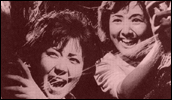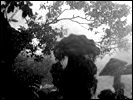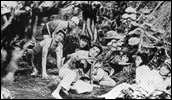Matango
- Year
- 1963
- Original title
- Matango
- Japanese title
- マタンゴ
- Alternative title
- Curse of the Mushroom People
- Matango: Attack of the Mushroom People
- Matango: Fungus of Terror
- Director
- Cast
- Running time
- 88 minutes
- Published
- 3 July 2001



by Jasper Sharp
From the fertile imagination of Ishiro Honda, the man that kicked off Toho's kaiju eiga with Godzilla (Gojira, 1954) launching a thousand men in rubber monster suits bouncing across the screens of the world, comes Matango, a lysergic-drenched, doom-laden allegory made in a brief break between two of his more characteristic monster movies, King Kong vs. Godzilla (Kingukongu tai Gojira, 1962) and Godzilla vs. Mothra (Mosura tai Gojira, 1964). Never released theatrically in the US but dubbed and sold to TV by American International Television in 1965, Matango, or Attack of the Mushroom People to give it its alternative title, is one of those films that is better known for its title than the actual film itself. But don't let its superficially humble B-movie aspirations fool you, as there's more than a spore of a good idea here.
A luxury leisure yacht cruises out into the wide blue ocean, whisking away its five carefree passengers from the breakneck pace of an industrialized modern Tokyo. The group, which includes a novelist, an eminent psychology professor, a TV presenter, and a company president, represents the cream of the crop of the new moneyed elite, products of the economic miracle that was Japan during the 1960s. But even as one of the happy holiday-makers breaks into song and dance beneath the clear azure skies, hints of bitterness and envy are already beginning to creep in below deck as the ship's captain and his sole crew member rail against the idle rich, these parasites with such little grasp of reality.
Suddenly the ship is blown off course by an unexpected squall. Severely out of his element, one of the wealthy upstarts asserts blindly that "the ship won't sink because it cost too much money", but before long they are drifting mastless across an empty sea, swept along by a freak current that deposits them on a deserted shoreline. The initial dilemma of food looks set to be short-lived, as giant clumps of mushrooms grow in abundance on this lush tropical island, but the discovery of the broken husk of an abandoned research vessel studying the effects of radiation, its surfaces coated with a thin layer of mould fails to perturb the marooned passengers from heeding the advice of their captain not to eat anything until they know its safe.
The women are the first to notice that there are no mirrors on board the deserted ship, the former crew having smashed them and scattered the shards to the remoter corners of the island. The discovery of the ship's log sheds some light on the mystery, warning of the giant fungi's damaging effect on the human nervous tissue, as does the appearance of a green slimey mutated mushroom man at one of the portholes, but by this stage it is too late as the passengers descend into paranoia and psychosis under the influence of the hallucinogenic fungus.
Adopting the holistic view of nature as being in a constant state of flux, Matango pre-empts James Lovelock's seminal Gaia hypothesis (which views the Earth as a global ecosystem which sustains and regulates itself like a living organism) by a couple of years. The traditional Linnaean idea of an assumed biological hierarchy where man sits at the top of a descending chain where plant and fungus lie somewhere at the bottom is kicked into touch, the perspective here being that man is yet another form of organic matter and very much a part of his natural environment, inextricably linked to it as it is to us.
Honda portrays the way in which the rapid economic growth of Japan has resulted in a population divorced from these cultural and natural origins. The rigid mechanical efficiency of a modern society is revealed to be merely illusionary, as the hierarchy crumbles steadily the further this ship of fools is removed from it. Carried away by the forces of nature on a freak ocean tide, the film's irreversible conclusion is that of evolution turning full circle; man becomes mushroom as he reverts back to the primordial sludge.
Also inescapable is the drug metaphor, which is saturated within the entire look of Matango, from the verdant colour palate to the surreal bulbous landscapes and glades lush with sprouting mushrooms (cf Sogo Ishii's mid-90s 'head' film, August in the Water). At one point psilocybin is mentioned explicitly, but the scenes in which the characters break down into jittery paranoid wrecks, staring unflinchingly at objects six inches away from their noses and threatening to kill one another will no doubt elicit a few knowing smiles. (It's perhaps worth mentioning that Japan is one of the few countries where Magic Mushrooms are legally available.) The pace of this undeniably trippy imagery steadily gains inertia before escalating into full-blown psychedelia, with hallucinary flashbacks of the Tokyo skyline superimposed over by seductive dancing girls as the characters descend into complete delirium at the climax. As the mushrooms begin taking over the whole island, and the mutated fungoid remains of the crew of the previous wreck close in, a complete drug-induced assimilation into the environment seems to be the only solution, a complete return to nature.
The dubbed dialogue, an approach here, as always, that threatens to strip out all nuance from the characters flattening them into mere one-dimensional ciphers (most of Honda's films suffered due to alterations in their US release versions), will no doubt prompt sniggering accusations of 'cheesiness' and off-hand dismissals, but at the end of the day Matango is far too lively to be boring. Given the time it was made, it presents us with a remarkably pessimistic, apocalyptic yet thought-provoking subtext that is as valid now as it was then. As the ship's sole survivor gazes through the bars of his asylum window onto the jumbled neon skyline, he weighs up the pros and cons of returning to a drug-sozzled bliss on a tropical Garden of Eden with the girl he left behind, or forging a new life within the pulsing neon nuthatch of modern Tokyo. Salaryman or Mushroom man, now just which is the most fungi to be?